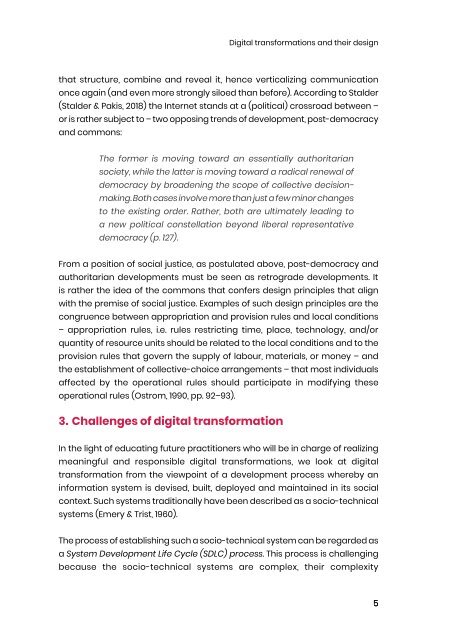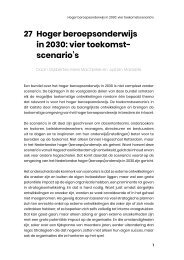13. Digital transformations and their design – renewal of the socio-technical approach
You also want an ePaper? Increase the reach of your titles
YUMPU automatically turns print PDFs into web optimized ePapers that Google loves.
<strong>Digital</strong> <strong>transformations</strong> <strong>and</strong> <strong><strong>the</strong>ir</strong> <strong>design</strong><br />
that structure, combine <strong>and</strong> reveal it, hence verticalizing communication<br />
once again (<strong>and</strong> even more strongly siloed than before). According to Stalder<br />
(Stalder & Pakis, 2018) <strong>the</strong> Internet st<strong>and</strong>s at a (political) crossroad between <strong>–</strong><br />
or is ra<strong>the</strong>r subject to <strong>–</strong> two opposing trends <strong>of</strong> development, post-democracy<br />
<strong>and</strong> commons:<br />
The former is moving toward an essentially authoritarian<br />
society, while <strong>the</strong> latter is moving toward a radical <strong>renewal</strong> <strong>of</strong><br />
democracy by broadening <strong>the</strong> scope <strong>of</strong> collective decisionmaking.<br />
Both cases involve more than just a few minor changes<br />
to <strong>the</strong> existing order. Ra<strong>the</strong>r, both are ultimately leading to<br />
a new political constellation beyond liberal representative<br />
democracy (p. 127).<br />
From a position <strong>of</strong> social justice, as postulated above, post-democracy <strong>and</strong><br />
authoritarian developments must be seen as retrograde developments. It<br />
is ra<strong>the</strong>r <strong>the</strong> idea <strong>of</strong> <strong>the</strong> commons that confers <strong>design</strong> principles that align<br />
with <strong>the</strong> premise <strong>of</strong> social justice. Examples <strong>of</strong> such <strong>design</strong> principles are <strong>the</strong><br />
congruence between appropriation <strong>and</strong> provision rules <strong>and</strong> local conditions<br />
<strong>–</strong> appropriation rules, i.e. rules restricting time, place, technology, <strong>and</strong>/or<br />
quantity <strong>of</strong> resource units should be related to <strong>the</strong> local conditions <strong>and</strong> to <strong>the</strong><br />
provision rules that govern <strong>the</strong> supply <strong>of</strong> labour, materials, or money <strong>–</strong> <strong>and</strong><br />
<strong>the</strong> establishment <strong>of</strong> collective-choice arrangements <strong>–</strong> that most individuals<br />
affected by <strong>the</strong> operational rules should participate in modifying <strong>the</strong>se<br />
operational rules (Ostrom, 1990, pp. 92<strong>–</strong>93).<br />
3. Challenges <strong>of</strong> digital transformation<br />
In <strong>the</strong> light <strong>of</strong> educating future practitioners who will be in charge <strong>of</strong> realizing<br />
meaningful <strong>and</strong> responsible digital <strong>transformations</strong>, we look at digital<br />
transformation from <strong>the</strong> viewpoint <strong>of</strong> a development process whereby an<br />
information system is devised, built, deployed <strong>and</strong> maintained in its social<br />
context. Such systems traditionally have been described as a <strong>socio</strong>-<strong>technical</strong><br />
systems (Emery & Trist, 1960).<br />
The process <strong>of</strong> establishing such a <strong>socio</strong>-<strong>technical</strong> system can be regarded as<br />
a System Development Life Cycle (SDLC) process. This process is challenging<br />
because <strong>the</strong> <strong>socio</strong>-<strong>technical</strong> systems are complex, <strong><strong>the</strong>ir</strong> complexity<br />
5


















